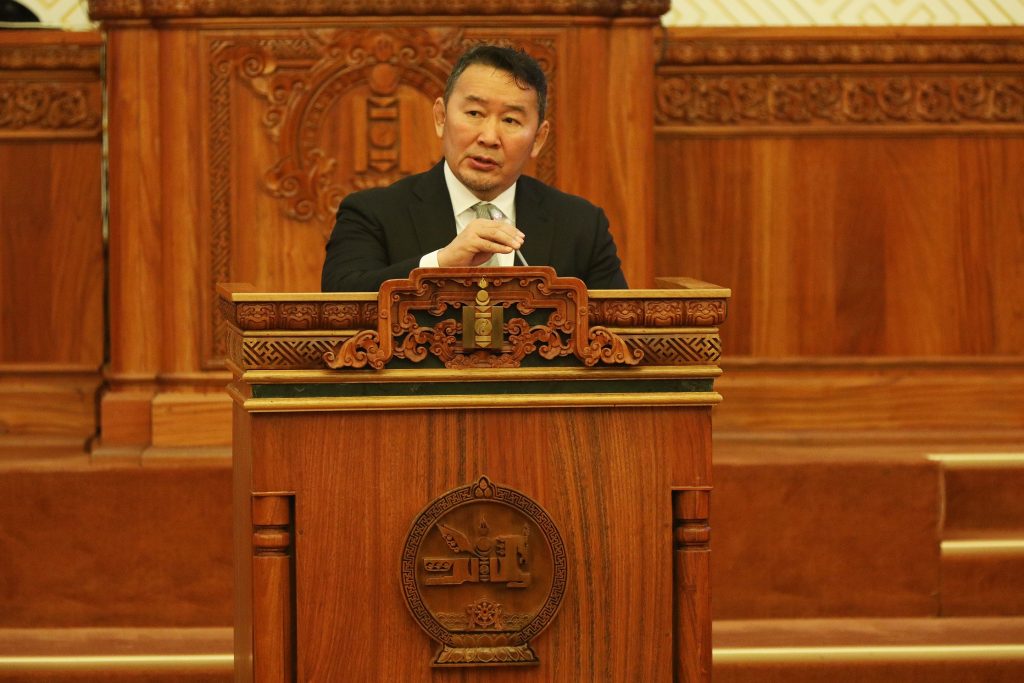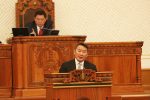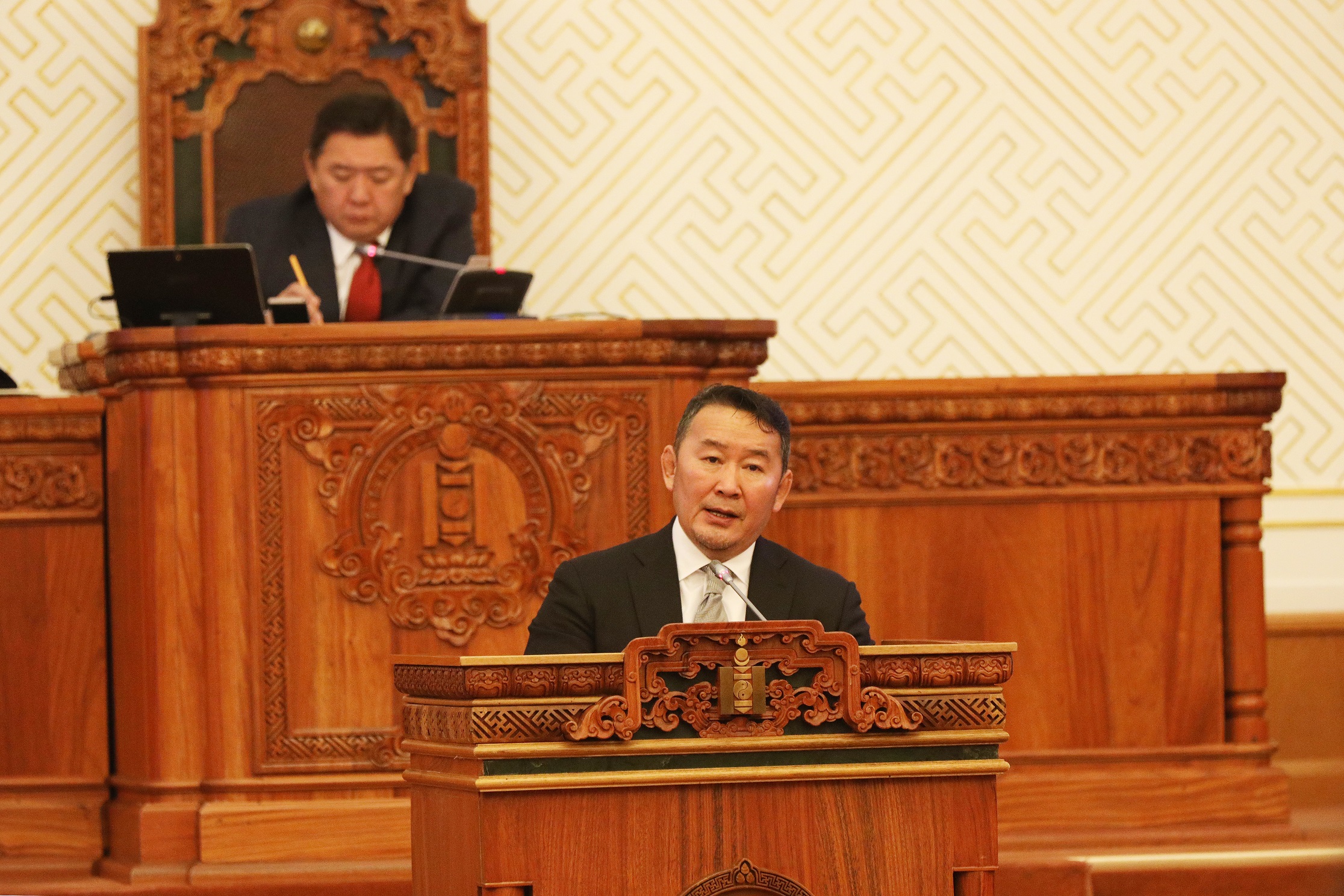ADDRESS BY PRESIDENT KHALTMAAGIIN BATTULGA AT THE PLENARY MEETING OF THE STATE GREAT KHURAL
In connection to the discussion of bills on the 2019 State Budget, the 2019 Social Insurance Fund Budget, the 2019 Health Insurance Fund Budget, the 2019 Fiscal Framework Statement, and the 2020-2021 Budget Assumption by Parliamentary Standing Committees and the Parliament, President of Mongolia Khaltmaagiin Battulga delivered a speech at the plenary meeting of the Parliament today.
President Battulga said:
“Speaker of the State Great Khural,
Members of the State Great Khural,
The Parliament is discussing a bill on the 2019 State Budget at a time when the world’s leading finance experts and senior officials of the International Monetary Fund are repeatedly warning about a looming global financial crisis.
When the global financial and economic assumptions are as gloomy, the 2019 Budget Proposal of Mongolia looks too optimistic, oblivious to the imminent crisis, far from real world, more intent on influencing the 2020 General Elections, and full of conflict of interest.
The Cabinet has not refrained from its “corruption” habit of increasing investment in the constituencies of Members of the Parliament (MP) to appease them in the pre-election year which has been recurrent for many years. The investment in constituencies or the so-called “MP’s Money” which was first introduced in the amount of MNT 1 million in 2000-2004 by the then Prime Minister N.Enkhbayar to silence his 72 MPs has reached MNT 5 billion today, increasing 5,000 times. I am glad to find that the MPs themselves have critical opinion about this. After the State Budget has been already framed, the MPs are now allocating money for buildings that don’t even have blueprint in their constituencies. The fact that 375 buildings (66 percent) out of 570 budgeted buildings don’t have blueprints and funds, according to MP Ch.Ulaan, violates Section 29.4 of the Law on Budget. If we estimate the standard cost of a single object to build in rural areas at MNT 1 billion, we could save at least MNT 400 billion. Buildings that don’t have blueprints and precise budgeted cost pressurize the budget as their costs increase over the years. The people have named such illegal objects the “MPs’ Money”. I would like to propose removal of these 375 objects from the bill.
Long experience shows that the constituents no longer value a MP who was elected on these principles. It is ideal if You, MPs, take a rational approach to the problem and adjust the budget so that the national economy will be least affected by the anticipated financial crisis and remain intact. The people will evaluate you based on your works toward sustainable future of this country and maintaining and increasing their income and jobs, but not whether if you cast building foundations in your constituencies.
In short, the 2019 Budget Proposal has been drafted poorly and deserves weighty criticism. It is praiseworthy that the MPs are pointing out and criticizing that the people who drafted it were driven by conflict of interest. For example, investment worth MNT 52.8 billion has been budgeted in Uvs Aimag, the constituency of the Minister of Finance, which is 10 times higher than in other provinces–it is a shameless and unscrupulous action.
I have several criticisms and suggestions regarding the 2019 Budget Proposal.
First of all, I would like to comment on the excessive budgeting that is being done in belief that the economy is on the way to growth.
If we take a careful look at the economic indicators, there is no improvement, but increased inflation and weakened rate of Tugriks. To compare, inflation rate stood at 1.9 percent at the end of 2015, but reached 8.8 percent before the end of 2018. The exchange rate of Mongolian Tugriks against US Dollars was 1,950 in July, 2016, but is 2,552 today. This can only mean that the Government and the Bank of Mongolia failed to perform their duties to maintain the inflation and exchange rates, which led to the increase of the price of common goods and services, because of which the Mongolian people are losing their income and the middle class that carries the society is being eliminated. The fuel prices have climbed up by 19-30 percent, but the Minister in charge and the Government are sitting still, unable to respond.
The next subject is debt! Two years ago, the ruling Mongolian People’s Party won the elections with the help of debt paranoia. For the last two years, the total debt hasn’t been decreasing, but increasing. The public debt amounted to MNT 16 trillion and 612 billion in the first half of 2016, but is MNT 21.1 trillion now. The decision-makers who promised not to increase the debt and get loans have borrowed USD 500 million with the Mazaalai Bond, USD 600 million with the Khuraldai Bond, and USD 800 million with the Gerege Bond. It is incomprehensible why they are talking about “debt repayment” when it is the opposite case.
The full repayment of the bonds will begin in 2021. This will coincide with a decline in the commodities cycle. On top of it, the global economy might face an unprecedented crisis. It is hard to imagine what will happen if all these risks coincide. The Cabinet must forget about elections. It is time to focus on overcoming the looming risks.
The public debt continues to increase due to adoption of budgets that have deficit every year. With the MNT 2.7 trillion budget deficit in 2017, MNT 2.4 trillion budget deficit in 2018, and the projection of MNT 1.9 trillion deficit in 2019, the public debt reaches MNT 7 trillion—it is a huge risk. Deficit translates directly into debt. It has been said that public debt was reduced significantly this year, but it is due to a calculation method which allows for a transfer of internal debt to the Bank of Mongolia. This led to another risk which is the increasing debt securities of the central bank.
As of June, 2016, the amount of debt securities of the Bank of Mongolia was MNT 430 billion, but it reached 4 trillion and 276 billion as of September 10th, 2018, demonstrating how much the internal debt increased by.
There are a number of illegal clauses in the 2019 Budget Proposal. Unless the violations of the Clause No. 5.1.3 of Fiscal Stability Law and Clause No. 6.2.2 and Section No. 29.4 of the Law on Budget are corrected, the bill can’t be passed. MP Ch.Khurelbaatar used to talk about and demand “a budget without deficit”, but now that he is Minister of Finance, he proposes a budget that has 5.4-8 percent deficit. The gap between what was promised and what was done is the main reason why the Cabinet is losing its credibility to the people. Especially, the budget must be adopted after the criticisms of the MPs on how the Law on Budget has been violated and foreign loan and aid programs are about to be centralized at the Ministry of Finance have been investigated and the violations are corrected.

Criticism points on the budget revenue assumption.
The National Audit Office’s assertion that revenue generation will be the biggest risk because the revenue assumptions are abstract and non-figurative is correct.
The economy hasn’t grown in its entirety and only commodities export, in particular the value and physical amount of coal have increased, but the Cabinet has an optimistic assumption that GDP growth will be 8 percent in 2019. You must be aware that this can create the risk of entangling the economy by repeating the mistake of the Cabinet led by Su.Batbold in 2009-2012 when it borrowed revenue it hadn’t earned and distributed the money before the elections. I understand that the recent experiences have shown us the damages caused by optimistic assumption of revenue that is dependent on commodities cycle. Are we forgetting this quickly?
It has been estimated that the balanced revenue of the 2019 budget would increase by MNT 2 trillion and 445.1 billion, and MNT 1.3 trillion of it would come from mining sector, which constitutes 53.1 percent of the total expected revenue. In other words, it has been estimated that more than half of the budget revenue is projected to be generated by the most unwarranted revenue source—it is a risk that could create a big hole in the budget.
The Ministry of Finance claims that revenue will increase with the adoption of the Package Law on Taxation which is yet to be passed, but it doesn’t specify by how much. Let me remind you again that the State Budget must be drafted only within the framework of currently effective laws. Such revenue that is based on intangible estimation could lead to budget shortcoming. The economy is measured by tangible revenue and not by empty assumption.
Tax exemption or discount has been estimated to reach the amount MNT 1.85 trillion in 2019, 22.6 percent higher than the previous year. This makes 12.7 percent of the total tax revenue. After this much exemption, will the tax revenue hold up?
I conclude that the budget revenue generation is a sort of declaration and impractical, therefore, prone to risks. I demand that it be redrafted with tangible quality and due calculation aimed to confront the looming crisis with the minimum risks.
On budget expenditure and investment in constituencies
The only positive aspect here should not go unacknowledged. Some MPs initiated and submitted a draft resolution on Some Measures to be taken in regard to Child Monetary Benefit. As outlined in the draft resolution, the Child Money benefit will be granted to every child who made an appeal. This is a traditional policy and good practice of the Mongolian Government to increase its population. Based on a study that says around 10 percent of children didn’t use to receive the benefit when it targeted all children, around 90 percent of Mongolian children should benefit if the said resolution is adopted.
Let us take note of the ill-estimated, extravagant expenditure even in the recurrent cost planning of budgetary entities. In his speech during the opening of the Fall Session of the Parliament, Speaker M.Enkhbold mentioned that the State Great Khural had reduced its personnel as well as cost by 10 percent, thus saving MNT 546.4 million and said, “…I call for state organizations of all level to pursue a policy to reduce the employment and cost by 10 percent while discussing this year’s budget…” If we reduce the recurrent cost of the 2018 State Budget, MNT 7 trillion 455.8 billion, by 10 percent, MNT 745 billion can be saved. If we exclude that from the cost of budgetary entities in 2019, MNT 8 trillion and 230 billion, MNT 1.5 trillion can be saved. In doing so, the planned increase of public servants’ wage and pension in 2019 should remain in force.
While I support the Speaker’s proposal on the 10 percent reduction, I also believe that a 15 percent downsizing of the army of directors and chairpersons is possible. This involves all government institutions, deputy ministers, deputy officials, and government-owned entities. The number of public servants which was around 120-130 thousand a few years ago exceeds 180 thousand today.
We can save MNT 1.4 trillion or over USD 500 million in total if we subtract the wage and pension increase from the Speaker’s 10 percent reduction which will save almost MNT 1 trillion, and if we discard the unplanned objects in the Budget Proposal which will save almost MNT 400 billion. I am making a proposal to use this money on establishing a loan fund to support non-mining exports factories. If we save USD 500 million from the respective budgets of the next two years to build processing factories that will enable the export of animal-origin wealth our 160 thousand herding households annually plant (not dig), USD 1 billion will be accumulated. I am proposing to resolve the issue of long-term, low-interest loans that will support agricultural exports which has been on the agenda for many years.
It has been planned that the construction works of 570 buildings will be financed by MNT 2 trillion from the central budget in 2019. Compared to the previous year, it is an increase of MNT 959 billion or by almost 100 percent. If necessary, let the directors and chairpersons rent facilities from the private sector for the long term. I will mention a single example to support renting. The construction work of the premises of the Governor’s Office of Dornod Aimag dragged on for many years and the cost continued to increase, and the work is now about to be completed at the total cost MNT 6 billion 541 million. The Governor’s Office rents a building for MNT 20 million per year. Starting from this Parliament and this budget, let us stop constructing buildings at the rental cost of 327 years.
There is almost no government institution without increased budget for 2019. There is one organization where the performance is no match for the budget and the wage it receives. The recurrent cost of the Independent Authority Against Corruption (IAAC) amounts to MNT 12 billion 804.4 million. Instead of performing its duties to contribute to budget revenue by confiscating money from public servants who enriched themselves unjustly, resolving the case of MNT 60 billion, and returning offshore money, it is dealing with a school director. Although there are clear examples where the natural resources revenue is not coming in, tax is being evaded, and the revenue is turning into source of bribery when it comes in, it failed to act. I am sure that the MPs are asking themselves if we need to finance an institution that doesn’t do its job.
The circumstances demand from us practical revenue forecast and cost reduction approach. I request the officials at the Ministry of Finance and the Minister to consider and reflect the recommendations of the International Monetary Fund in the budgeting.
Recently, I addressed the necessity to make a systemic reform in Mongolia and called for your support. Again we see that a reform is absolutely essential when we look at the 2019 Budget Proposal. We are confronted by a critical time when the future of this country depends on whether if we have the will to make a reform and are capable of carrying it out. Unfortunately, neither wind nor will for reform can be seen in the budget proposed by the Cabinet.
As such, it is imperative to save from the budget and take some necessary actions using the saved funds. In particular, we cannot save from the budget on child protection. Crimes against children have gone out of control. In the last three years, over 3,000 minors committed crimes while 4,553 children became victims on the national level. But there are 17,138 children per one police officer in charge of prevention of crimes against children. In a year, over 1,000 people are being disabled by road accidents with the number of those who lost their lives being 650-700. Every day, 4-6 children are caught in road accidents. And the number of vehicles a traffic police officer should be in charge of is at least 20 times higher than the norm. Despite of constant reports on such perils in a country of only three million, adequate funds are not being allocated to tackle these issues.
Members of Parliament, I request you to be attentive toward reconsidering the 2019 Budget Proposal, avoiding expenditure that is partial to party interests, politicized, and inefficient, and fixing the non-figurative revenue forecast. You should not forget that it is not just me, but world leading experts that are warning about a difficult challenge ahead unless the next year’s budget is tangible. It will not be easy to work out the impending crisis. The experts’ anticipation of unprecedented and abrupt changes should not be ignored.
The international community recommends that reserves and savings should be generated and smart, new investment policy should be implemented to reduce the damage of the crisis. Therefore, I call upon you again to take a realistic approach that upholds the national interest and makes reform toward the next year’s budget.
I request you to pay attention to the ongoing events that are making it clearer that the budget policy won’t improve unless the system is remedied. There is a study that says the adopted budgets were amended almost every year, and in the process, the cost exceeded the adopted amount by MNT 1.3 trillion. Such irresponsible budget amendments must stop.
I call upon the Parliament to fulfill its main duty to oversee the activities of the Cabinet without being bribed and practice accountability in its work with national interest as its priority. If the Parliament adopts the 2019 Budget Proposal without correcting the above-mentioned mistakes and violations, I, as the head of state elected by the people, will put a veto on the decision owing to the common interest of the people.
Prime Minister Khurelsukh, you were appointed in your position after pledging to make a revolution. I would like to suggest that you start with a budget revolution. The Speaker said that the budget can be saved by 10 percent. I believe that 15 percent feasible. I am confident that You, the Prime Minister, will show a good example with even 20 percent. I am calling a meeting of the National Security Council today.
Thank you for your attention.”


